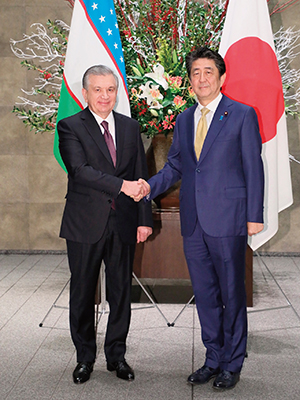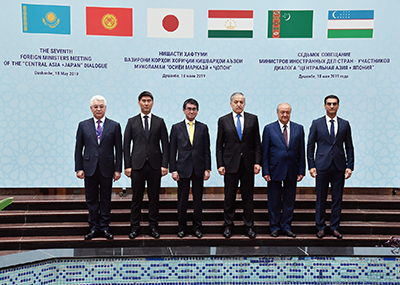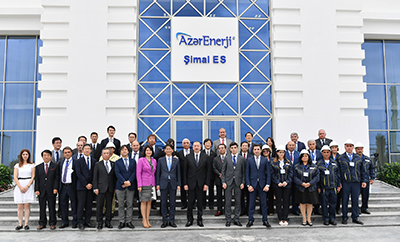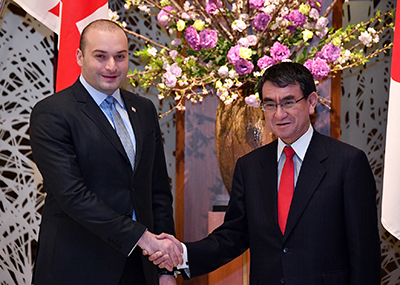Diplomatic Bluebook 2020
Chapter 2
Japan's Foreign Policy that Takes a Panoramic Perspective of the World Map
2 Countries in Central Asia and Caucasus
(1) Overview
Countries in Central Asia and Caucasus are situated in a location of geopolitical importance that connects Asia, Europe, Russia and the Middle East, and have abundant natural resources such as oil, natural gas and uranium. Each country also has significant importance when seeking the stability of the region as a whole and addressing key challenges which the international community faces such as fighting against terrorism and countering illicit drugs.
Japan continues to work to strengthen bilateral ties with these countries through VIP visits, etc., and will be continuing initiatives to promote regional cooperation using the framework of the “Central Asia plus Japan” Dialogue,4 etc.
- 4 The “Central Asia plus Japan” Dialogue was launched in 2004 in order for Japan to promote regional cooperation as a “catalyst” from the perspective that regional cooperation is essential to resolving common regional issues for the stability and development of Central Asia (Kazakhstan, Kyrgyzstan, Tajikistan, Turkmenistan, Uzbekistan). So far there have been various discussions with the participation of experts and business people, in addition to the seven Foreign Minsters' Meetings. It has been more than 15 years since its establishment, and in recent years the focus has been on practical cooperation.
(2) Central Asian Countries
Japan supports the “open, stable and self-sustained development” of Central Asia, and is promoting diplomacy as a “catalyst” for the development of regional cooperation aiming to contribute to regional and international peace and stability. The pillars of Japan's diplomacy in Central Asia consist of the following: steadily strengthening of bilateral relationships; encouraging regional cooperation and contribution to the common issues of the region through the “Central Asia plus Japan” Dialogue; and cooperating in the global arena.
In 2019, following the previous year, active exchanges including VIP visits were carried out. In October, when the Ceremony of the Enthronement of His Majesty the Emperor took place, First President of Kazakhstan Nazarbayev, President of the Kyrgyz Republic Zheenbekov, and President of Turkmenistan Berdimuhamedov visited Japan and held meetings with Prime Minister Abe respectively. In the meeting with Prime Minister Abe, First President Nazarbayev praised Japan's initiative for the “Central Asia plus Japan” Dialogue, and the two leaders shared the view to promote regional cooperation, including further collaboration within the Dialogue. In the meeting with Prime Minister Abe, President Zheenbekov stated that bilateral relations had made great progress since Prime Minister Abe's visit to the Kyrgyz Republic in 2015, and he expressed his hopes for developing business cooperation. In the meeting with President Berdimuhamedov, Prime Minister Abe stated that combining Turkmenistan's rich resources with Japan's quality infrastructure could make significant contributions to Turkmenistan's development, and the two leaders agreed to cooperate on a variety of issues.
In December, President of Uzbekistan Mirziyoyev and Minister of Foreign Affairs Kamilov visited Japan. This was President Mirziyoyev's first visit to Japan, and he visited Nagoya and Tokyo in addition to having his first Summit Meeting with Prime Minister Abe. Prime Minister Abe reaffirmed Japan's friendship with Uzbekistan, which has traditionally been friendly toward Japan, announced new support (including a total of 190 billion yen of ODA loans) in the fields of power generation and agriculture for the development of the country undergoing reforms, and the two leaders agreed to expand exchanges and cooperation in all fields, including on economic fronts. The two leaders also signed the “Joint Statement on Further Deepening and Expanding Strategic Partnership between Japan and Uzbekistan” (the Japan-Uzbekistan Tax Convention and the Japan-Uzbekistan Customs Mutual Assistance Agreement were also signed).
 Japan-Uzbekistan Summit Meeting (December 19, Tokyo; Photo: Cabinet Public Relations Office)
Japan-Uzbekistan Summit Meeting (December 19, Tokyo; Photo: Cabinet Public Relations Office)From Japan, Foreign Minister Kono visited Tajikistan in May and attended the Seventh Foreign Ministers' Meeting of the “Central Asia plus Japan” Dialogue. During the meeting, participants of the member countries reaffirmed the track record and direction of cooperation between Japan and Central Asia, and also had discussions focusing on “tourism” as a new field for practical cooperation. They also had discussions on trade, investment, and development areas, and adopted the “Joint Statement and Action Plan on Regional Cooperation,” as well as confirming the importance of supporting improvements to the regional business environments and the importance of the regional cooperation in the regional security.
 7th Foreign Ministers' Meeting of the “Central Asia plus Japan” Dialogue (May 18, Dushanbe, Tajikistan)
7th Foreign Ministers' Meeting of the “Central Asia plus Japan” Dialogue (May 18, Dushanbe, Tajikistan)Foreign Minister Kono also took advantage of this opportunity to hold Foreign Ministerial meetings with Tajikistan, Uzbekistan, Kazakhstan, the Kyrgyz Republic and Afghanistan (participated as a guest country).
In addition, from Central Asian countries, a group headed by Chairman of the Inter-Parliamentary Group of Tajik-Japanese Friendship Salimzoda, a group headed by Vice-Chairman of the Lower House of the Parliament of Kazakhstan Issimbayeva, and Deputy Governor of the Ahal Region of Turkmenistan Berdimuhamedov visited Japan in March, Deputy Prime Minister of Uzbekistan Ganiev visited in July, and Minister of Investments and Foreign Trade of Uzbekistan Umurzakov, and First Deputy Chairman of the Lower House (Senate of Parliament) of Uzbekistan Safaev visited in October.
There has been a movement amongst Central Asian countries in recent years to promote regional cooperation. The Fifth Summit of the Conference on Interaction and Confidence Building Measures in Asia (CICA) and the 19th Heads of State Council of the Shanghai Cooperation Organisation (SCO) were held in June, the Heads of Government Meeting of the Commonwealth of Independent States (CIS) was held in October and a session of the Collective Security Council of the Collective Security Treaty Organization (CSTO) was held in November. Additionally, in November the second Consultative Meeting of the Heads of States of Central Asia was held in Tashkent (Uzbekistan) for the first time in a year and a half. With the participation of leaders from all five countries, including the President of Turkmenistan, who was absent last time, the meeting adopted a joint statement enshrining regional cooperation in areas such as economy, transportation, regional security, and the environment. At the same time, the attendees also decided to hold Summit Meetings and Foreign Minsters' Meetings on a regular basis.
(3) Caucasus Countries
In Caucasus countries, there still exist disputes over South Ossetia and Abkhazia in Georgia and over Nagorno-Karabakh between Armenia and Azerbaijan. At the same time, this region has potential to be a gateway connecting Asia, Europe and the Middle East and strategic importance that directly affects the peace and stability of the international community. During Foreign Minister Kono's visit to the Caucasus countries in 2018, he announced the Caucasus Initiative, the basic policy of Japan's diplomacy for this region, which is comprised of two pillars: (1) assistance for human resources development of architects for state building (human resources development); and (2) assistance for paving the way to “Appealing Caucasus” (infrastructure development and business environment improvement). In 2019, Japan developed cooperation with each country as follows.
In relation to Azerbaijan, Minister of Taxes Jabbarov visited Japan in March and met with State Minister of Finance Ueno Kenichiro and State Minister for Foreign Affairs Abe Toshiko. From Japan, Parliamentary Vice-Minister for Foreign Affairs Yamada Kenji visited Azerbaijan in September and, along with President Aliyev, attended the opening ceremony of the “Shimal Gas Combined Power Plant, Second Unit” which was constructed through a Japanese ODA loan. In addition, Mr. Yamada paid a courtesy call to Prime Minister Mammadov, had a meeting with Foreign Minister Mammadyarov, and another meeting with Minister of Ecology and Natural Resources Babayev who also served as Chairman of the Japan-Azerbaijan Economic Joint Committee.
 Completion ceremony for the “Shimal Gas Combined Power Plant, Second Unit” constructed in cooperation with Japan (September 5, Azerbaijan)
Completion ceremony for the “Shimal Gas Combined Power Plant, Second Unit” constructed in cooperation with Japan (September 5, Azerbaijan)In relation to Armenia, the Japan-Armenia Investment Agreement entered into force in May, which is expected to promote investment between the two countries and make economic relations even closer. President Sarkissian visited Japan to attend the Ceremony of the Enthronement of His Majesty the Emperor in October and had a meeting with Prime Minister Abe. The two leaders agreed to work closely together toward the future cooperation while touching on economic cooperation between both countries.
In relation to Georgia, Prime Minister Bakhtadze visited Japan in March. Prime Minister Bakhtadze visited Osaka and Tokyo, confirmed and welcomed with Foreign Minister Kono the substantial conclusion of negotiations on the main text of the investment agreement between the two countries, and had a meeting with Deputy Prime Minister and Minister of Finance Aso Taro. In addition, he attended the opening ceremony of the Japan-Georgia Business Forum and also the opening ceremony of a Georgian wine exhibition. Minister of Economy and Sustainable Development Kobulia, who was accompanying the Prime Minister, signed a memorandum of cooperation between a Japanese company and the Ministry of Economy and Sustainable Development of Georgia. During her visit to Japan for the Ceremony of the Enthronement of His Majesty the Emperor in October, President Zourabichvili agreed with Prime Minister Abe on the importance of the investment agreement, and expected to further strengthen the relationship.
 Meeting between Foreign Minister Kono and Prime Minister of Georgia Bakhtadze (March 13, Tokyo)
Meeting between Foreign Minister Kono and Prime Minister of Georgia Bakhtadze (March 13, Tokyo)